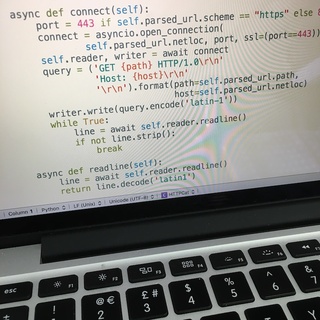☑ That's Good Enough
- The State of Python Coroutines: asyncio - Callbacks vs. Coroutines Tue Jul 05 2016
- The State of Python Coroutines: Introducing asyncio Thu Jun 16 2016
- The State of Python Coroutines: yield from Fri Jun 10 2016
- Fighting Fonts on Mobile Thu Oct 08 2015
- C++ Streaming Pains Thu Aug 20 2015
- Validating UK Postcodes Tue Aug 18 2015
- Time zones and cron Tue Jul 21 2015
- HTTP/2 Fri May 08 2015
- C++11: Library Changes: Pointers, Randoms, Wrappers and more Fri Apr 24 2015
- C++11: Library Changes: Threading, Tuples, Hashing and Regexes Mon Apr 13 2015
July 2016

☑ The State of Python Coroutines: asyncio - Callbacks vs. Coroutines
I recently spotted that Python 3.5 has added yet more features to make coroutines more straightforward to implement and use. Since I’m well behind the curve I thought I’d bring myself back up to date over a series of blog posts, each going over some functionality added in successive Python versions — this one covers more of the asyncio module that was added in Python 3.4.
This is the 3rd of the 4 articles that currently make up the “State of Python Coroutines” series, the first of which was The State of Python Coroutines: yield from.
Read article ( 16 minutes )
June 2016

☑ The State of Python Coroutines: Introducing asyncio
I recently spotted that Python 3.5 has added yet more features to make coroutines more straightforward to implement and use. Since I’m well behind the curve I thought I’d bring myself back up to date over a series of blog posts, each going over some functionality added in successive Python versions — this one covers parts of the asyncio module that was added in Python 3.4.
This is the 2nd of the 4 articles that currently make up the “State of Python Coroutines” series, the first of which was The State of Python Coroutines: yield from.
Read article ( 7 minutes )

☑ The State of Python Coroutines: yield from
I recently spotted that Python 3.5 has added yet more features to make coroutines more straightforward to implement and use. Since I’m well behind the curve I thought I’d bring myself back up to date over a series of blog posts, each going over some functionality added in successive Python versions — this one covers the facilities up to and including the yield from syntax added in Python 3.3.
This is the 1st of the 4 articles that currently make up the “State of Python Coroutines” series.
Read article ( 9 minutes )
October 2015

☑ Fighting Fonts on Mobile
I recently ran into some odd font sizing issues when viewing my website on my iPhone and discovered a few interesting tidbits about rendering on mobile browsers along the way.
Read article ( 4 minutes )
August 2015

☑ C++ Streaming Pains
C++ streams have their advantages, but in some ways they’re a downright pain.
Read article ( 6 minutes )

☑ Validating UK Postcodes
I find myself needing to enter UK addresses on a fairly regular basis and it never fails to amaze me how poor some of the syntax checking is - basic validation of a UK postcode is really not even remotely difficult.
Read article ( 5 minutes )
July 2015

☑ Time zones and cron
Time zones can be tricky beasts, particularly where daylight savings time is concerned. This post discusses issues around apply them to something like the ubiquitous Unix cron daemon.
Read article ( 9 minutes )
May 2015

☑ HTTP/2
After eighteen years there’s a new version of HTTP. Having heard comparatively little about it until now, I decided to take a quick look.
Read article ( 19 minutes )
April 2015

☑ C++11: Library Changes: Pointers, Randoms, Wrappers and more
I’ve finally started to look into the new features in C++11 and I thought it would be useful to jot down the highlights, for myself or anyone else who’s curious. Since there’s a lot of ground to cover, I’m going to look at each item in its own post — this is the second of the final two that cover what I feel to be the most important changes to the standard template library.
This is the 8th of the 8 articles that currently make up the “C++11 Features” series, the first of which was C++11: Move Semantics.
Read article ( 15 minutes )

☑ C++11: Library Changes: Threading, Tuples, Hashing and Regexes
I’ve finally started to look into the new features in C++11 and I thought it would be useful to jot down the highlights, for myself or anyone else who’s curious. Since there’s a lot of ground to cover, I’m going to look at each item in its own post — this is the first of the final two that cover what I feel to be the most important changes to the standard template library.
This is the 7th of the 8 articles that currently make up the “C++11 Features” series, the first of which was C++11: Move Semantics.
Read article ( 11 minutes )
